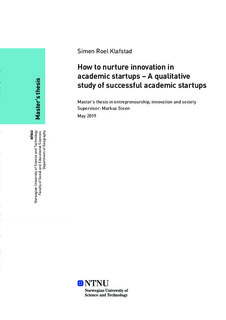| dc.description.abstract | På grunn av økt fokus på entreprenørskap og innovasjon i samfunnet, har akademiske
oppstartsbedrifter blitt viktige bidragsytere til lokal og regional utvikling. Dette har ført
utvikling av entreprenørielle økosystemer bestående av nettverk, universiteter, myndigheter,
støttetjenester, kapital og human kapital.
Denne masteroppgaven undersøker hvordan akademiske oppstartsbedrifter lykkes, i samsvar
med det norske innovasjonssystemet. Selv om den norske entreprenørskaps og
innovasjonspolitikken er tilrettelagt for at det skal være attraktivt å være en akademisk
entreprenør, så er Norge avhengig av entreprenører som er villige til å utnytte disse fordelene.
Dette forskningsprosjektet fokuserer derfor på hvordan akademiske entreprenørielle «team»
strategisk planlegger for innovasjon.
Dette forskningsprosjektet undersøker egenskapene til vellykkede norske akademiske
oppstartsbedrifter, med et utvalg av fem oppstarter som har oppnådd suksess innen ett år etter
at det entreprenørielle «teamet» ble uteksaminert fra sin mastergrad. Suksess i dette
forskningsprosjektet er definert som at entreprenørene kan sikre sin egen sysselsetting gjennom
lønn fra oppstartsbedriften.
Ved hjelp av kvalitativ metode finner dette forskningsprosjektet empiriske bevis som støtter at
sammensetningen av akademiske entreprenørielle team er tverrfaglige og motivert av
muligheten til å kommersialisere sin egen kunnskap. Et annet empirisk funn er at
kommunikasjon og kunnskapsdeling på tvers av det entreprenørielle «teamet» er viktig for
strategisk planlegging for innovasjon. Vellykkede akademiske oppstartsbedrifter har et nært
samarbeid med kunder som er karakterisert av en tøff «go/kill» beslutningsprosess. Det siste
funnet i dette forskningsprosjektet viser at universitetet i entreprenørøkosystemet er viktig for
akademiske oppstarter gjennom å få tilgang til kvalifisert human kapital, mentorer og faglige
bidragsytere. | |
| dc.description.abstract | Due to an increased focus on the importance of entrepreneurship and innovation in society,
academic startups have become an essential contributor to local and regional growth. This, in
turn, has led to a high increase of entrepreneurial ecosystems providing system components
such as networks, universities, government, professional and support services, capital, and
talent pool.
This paper explores how academic entrepreneurs, in correlation with the Norwegian innovation
system, succeed with their startup. Even though the entrepreneurship and innovation policy of
Norway has many factors that indicate that it should be attractive to be an academic
entrepreneur, Norway is dependent on entrepreneurs who in fact are willing to take advantage
of these benefits. This research project, therefore, focus on how academic entrepreneurial teams
structures strategic planning for innovation.
This research project examines the characteristics of successful Norwegian academic startups,
with a selection of five startups who achieved success within one year after they had graduated
from their master's degrees. Success in this research project is defined as the entrepreneurial
team being able to secure their employment through salary from their startup.
Using qualitative method, this research project finds evidence that supports the notion that the
composition of academic entrepreneurial teams is typically interdisciplinary and motivated by
the opportunity to commercialize their knowledge. Another empirical evidence is that
communication and education sharing across the entrepreneurial team is vital for strategic
planning for innovation. Also, successful academic startups have close cooperation with
customers and a tough go/kill decision-making process. Another key finding of this research
project is that the university in the entrepreneurial ecosystem is essential for academic startups
to access qualified human capital, mentors and professional contributors. | |
